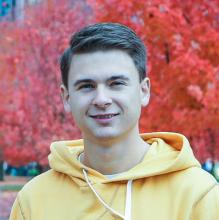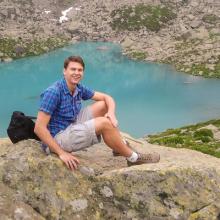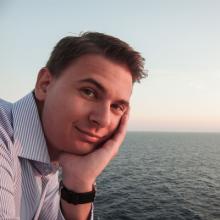Alessio Gallina
Why did you decide to pursue a graduate degree?
I find that doing research, and communicating its results, is a most rewarding activity. I think this is especially true in the field of physiotherapy, in which there is so much potential and still so much to be done. I decided to advance my training as a researcher, and a PhD program was the most appropriate choice for me to learn the skills that I will need in the future.
Why did you decide to study at UBC?
In 2012, I had the opportunity to work at UBC for three months with my current supervisor. I was really impressed by the quality and quantity of the research projects run in the laboratory, as well as by the quality of the faculty members and students I met here, so I decided to apply for the PhD program.
What is it specifically, that your program offers, that attracted you?
The breadth of research areas being investigated by the faculty members in the Department Physical Therapy, as well as the strong collaboration amongst their labs in joint projects, were certainly main reasons to choose UBC. I firmly believe that this kind of environment is the most stimulating for students who want to learn how to be researchers.
What was the best surprise about UBC or life in Vancouver?
The best surprise was that my first winter was not as rainy as I was told it would be! I was also surprised by the amount of physical activity that most of the people I met were engaged in. Some of them run, bike, and do sports almost every day. Is it because of all the great food you can eat in Vancouver?
What aspect of your graduate program do you enjoy the most or are looking forward to with the greatest curiosity?
I am really looking forward to learning, not only about my thesis topic, but also about other fields of research that are currently being investigated in other laboratories. A large amount of this learning is done by talking to and working with other graduate students. This is something I really appreciate in the Rehabilitation Sciences PhD program, as it makes me feel like I am really part of a team of researchers who work together.
What do you see as your biggest challenge(s) in your future career?
I am not sure I have a clear picture yet of what difficulties I might find in the future. For now I am still trying to figure out how I can take full advantage of the opportunities that surround me.
How do you feel your program is preparing you for those challenges?
UBC and the Department offer a wide range of opportunities to strengthen the skills we need to be ready for our future careers. As PhD student, I can take advantage of these possibilities to gain experience and build connections that will hopefully help me to be prepared for my life after the PhD. Every time I have asked for advice or assistance from my supervisor, the Department staff or other students, I have always had great feedback. I am confident that the program would support me if I need to be ready for a specific challenge.
What aspects of your life or career before now have best prepared you for your UBC graduate program?
The experience I obtained working as a research assistant in Italy before starting my PhD played a big role in shaping my research skills and interests. This, together with my clinical training as a physiotherapist, helped me define what the focus of my doctoral thesis will be. I also think that working in an international laboratory, as well as being involved in sport, has helped me to be prepared to be part of this program as international student.
What do you like to do for fun or relaxation?
When I am not in the lab, I enjoy spending time outside, walking around Vancouver or hiking in the woods and mountains outside the city. For sports, I play volleyball weekly and occasionally go out for a run or a bike ride. I also love to go out for dinner with my girlfriend and friends and try new food; we like to explore tastes from all over the world.
What advice do you have for new graduate students?
Plan the activities of your graduate program to improve the skills you think you'll need after your graduate degree. Be clear with your supervisor when you start working together, and take advantage of his/her supervision to choose the activities that best suit your needs.



